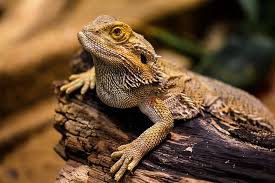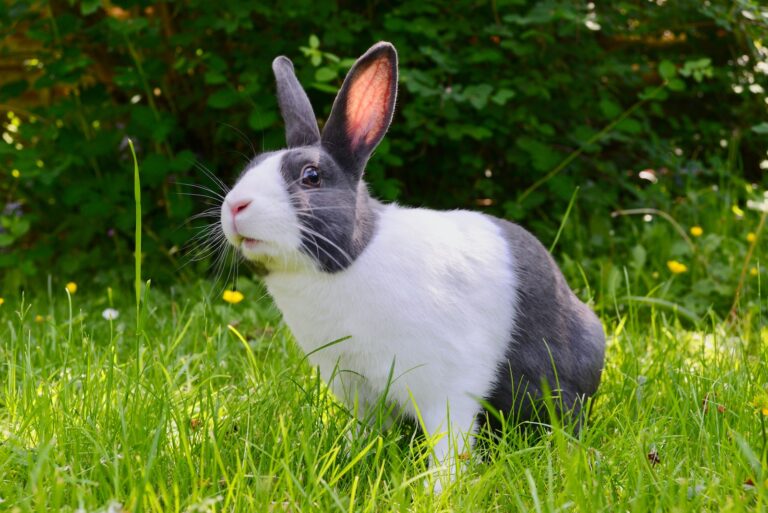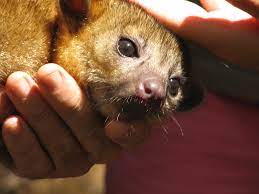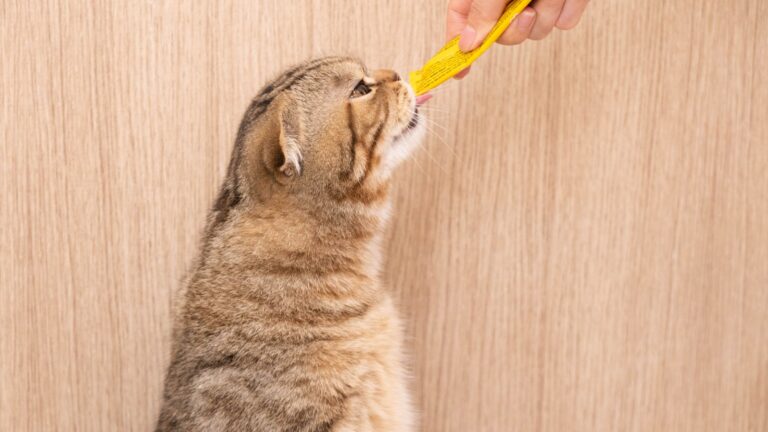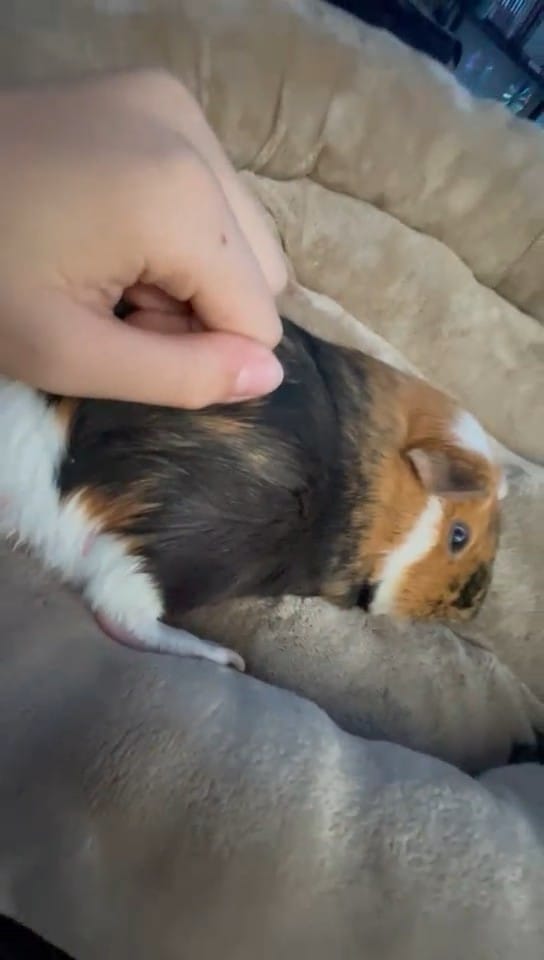The Whimsical World of Boston Terrier Grass-Sliding: A Celebration of Canine Playfulness and Personality
When your observant eyes catch your Boston Terrier engaging in an unexpected and somewhat comical behavior—sliding on the grass—it’s an invitation to delve into the fascinating world of canine playfulness. Much like humans, dogs possess an innate capacity for whimsy, expressing their vibrant personalities through an array of joyful and sometimes eccentric activities. The sight of your Boston Terrier sliding on the grass might seem like a delightful puzzle, and within this puzzle, several intriguing pieces come together to form a vivid portrait of their behavior. At the heart of this grass-sliding spectacle lies the vibrant thread of playfulness—a universal language that transcends species boundaries. Dogs revel in play for its own sake, embracing an array of behaviors that might baffle but never fail to entertain. Sliding on the grass becomes a canvas for their playful instincts to paint upon, a tangible manifestation of the sheer joy they find in engaging with their surroundings. Intriguingly, sliding on the grass could be more than mere play—it’s an embodiment of your Boston Terrier’s unique personality. Just as humans have quirks that set them apart, dogs, too, exhibit distinct traits that make them individuals. Sliding on the grass might be your Boston Terrier’s signature dance move, their whimsical expression of delight that leaves an indelible mark on your heart. The grass becomes more than just a surface—it’s a playground for your Boston Terrier’s imagination. The tactile sensation of the grass against their fur, the sensation of sliding, the scent of the earth—it all combines into a multisensory experience that they find utterly enchanting. It’s a celebration of the present moment, an embrace of the sheer exuberance of being alive. Attention-seeking, another intriguing facet of canine behavior, might also come into play. Your Boston Terrier may have realized that this particular maneuver draws curious gazes and chuckles from you. With this knowledge, they might slip and slide on the grass as a way to spark interaction, relishing the attention that follows their whimsical antics. As you watch your Boston Terrier sliding on the grass, you’re witness to a symphony of playful expression, personality quirks, and the pure, unadulterated joy that defines the canine spirit. In their playful dance, they remind us of the beauty of the everyday, the art of embracing the world with unbridled enthusiasm, and the sheer pleasure of living in the moment.
Reasons?
Playfulness: In the enchanting realm of canine behavior, playfulness emerges as a cherished thread that weaves through the tapestry of a dog’s personality. Like the sun breaking through the clouds, playfulness illuminates their world with moments of joy, creating a symphony of silliness that leaves smiles in its wake. Your Boston Terrier’s whimsical act of sliding on the grass becomes a delightful testament to this intrinsic playfulness—an ode to the enchantment they find in the simplest of activities. Playfulness, that universal language of joy, doesn’t adhere to societal norms or logical explanations. Some dogs are seasoned maestros of play, orchestrating their own delightful symphonies of silliness. For your Boston Terrier, sliding on the grass might be their playful masterpiece—an artistic expression of pure enjoyment. It’s the canine equivalent of laughter, a bubbling fountain of happiness that flows freely in their heart. Engaging in unconventional activities, such as sliding on the grass, showcases the boundless creativity of your Boston Terrier’s playful spirit. Just as children concoct imaginative games, dogs invent their own forms of amusement that might baffle but never fail to captivate. The grass becomes their canvas, the sliding their brushstroke—a vibrant portrayal of their zest for life. In the dance of playfulness, every gesture is infused with excitement. The feeling of the grass beneath their paws, the rush of sliding, the sensation of speed—it all combines into a sensory celebration that transcends logic. Your Boston Terrier might relish the feeling of the cool grass against their belly or the wind ruffling their fur as they glide.
This playful behavior isn’t just about the activity itself; it’s also a way for your Boston Terrier to entertain themselves. The grass becomes their stage, and the act of sliding a performance that brings them both amusement and fulfillment. The act of sliding is a story they create, an adventure they embark upon, and an expression of their unique character. As you witness your Boston Terrier sliding on the grass, you’re being treated to a whimsical glimpse into their world. In their playfulness, they remind us of the beauty of embracing life’s moments with a childlike wonder. They beckon us to step into the realm of the silly and the spontaneous, to dance with joy in the simplest of pleasures. In their play, they gift us with a reminder of the pure and unadulterated magic that comes from embracing life with an open heart and a willingness to find joy in every corner.
Energy Release: The world of canine behavior is a canvas painted with vibrant hues of expression, and sometimes, a seemingly peculiar behavior like sliding on the grass becomes a window into the fascinating world of energy release. For dogs, much like for humans, excess energy seeks an outlet—a release valve that transforms surplus vitality into joyful and often unconventional actions. In the case of your Boston Terrier’s playful grass-sliding antics, you’re witnessing a dynamic display of energy being set free. Energy is the life force that fuels dogs’ every move, animating their actions and shaping their interactions with the world around them. Boston Terriers, known for their exuberant personalities and boundless zest, often come with an abundance of energy that begs for release. This excess energy, when not channeled constructively, can find its own path—a path that might involve sliding on the grass with exuberance.
Think of your Boston Terrier as a coiled spring, brimming with potential energy that needs an outlet. Engaging in activities like sliding on the grass becomes a method of unwinding that spring, letting the energy burst forth in a delightful and engaging manner. The grass beneath their paws, the sensation of sliding, and the joy of movement combine to create a symphony of kinetic release. In breeds like Boston Terriers, renowned for their lively spirits, energy release becomes an important aspect of their well-being. These dogs possess a reservoir of vitality that requires careful management to ensure it’s channeled positively. Playful behaviors like grass-sliding offer an avenue for this energy to find expression, preventing it from manifesting as restlessness or boredom. It’s worth noting that energy release isn’t just about physical activity—it’s also about mental stimulation. Engaging in activities that challenge their minds, such as interactive games and puzzle toys, complements physical outlets and helps manage their overall energy levels. The synergy between physical and mental engagement forms a holistic approach to taming the energy beast within.
Exploration: Dogs explore their environment in various ways. Sliding on the grass could be a way for your Boston Terrier to interact with and learn about the texture and sensation of the grass.
Cooling Down: When you observe your Boston Terrier sliding on the grass, you’re peering into a chapter that speaks to the art of cooling down—a strategy they employ to maintain their well-being, especially on scorching days. Dogs, like all living beings, are attuned to the rhythms of temperature. As the sun blazes and heat blankets the surroundings, they’re driven by an innate instinct to find solace from the sizzling embrace of high temperatures. Sliding on the grass becomes more than a playful act—it transforms into a strategic endeavor to counteract the heat’s intensity. Consider the grass as nature’s cooling mat—a natural remedy for the sweltering conditions. When your Boston Terrier slides on the grass, they’re employing a technique that helps them regulate their body temperature. The grass, touched by the shade, offers a refreshing respite, cooling their belly as they slide against it. This simple act becomes a method of tapping into nature’s wisdom, harnessing the grass’s innate coolness to find comfort on a blazing day. The grass, with its dew-kissed blades or hidden pockets of coolness, becomes a partner in this dance of temperature regulation. The sliding action is more than a mere frolic—it’s a strategic way to counteract the heat, allowing your Boston Terrier to refresh and rejuvenate. Through this behavior, your Boston Terrier is embracing a survival strategy embedded in their genetic code. It’s a lesson from their ancestors, a method passed down through generations, that teaches them to seek comfort in nature’s elements. By sliding on the grass, they’re tapping into a deep well of instinct, following the timeless rhythms of nature to ensure their well-being.
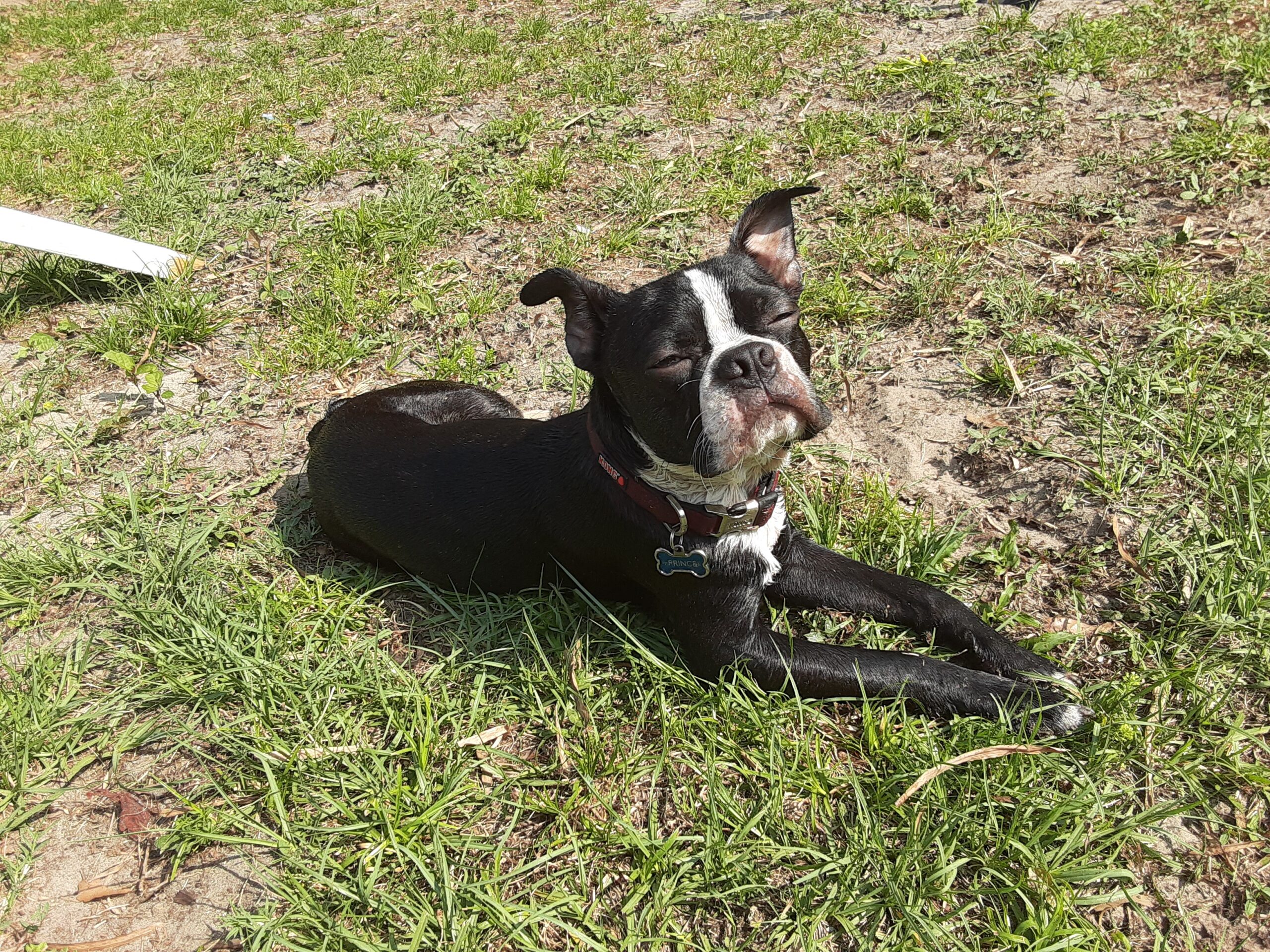
Behavioral Quirk: In the wondrous tapestry of the animal kingdom, individuality shines like a brilliant gem, adorning each creature with a constellation of unique behaviors and quirks. When you catch your Boston Terrier engaged in the peculiar act of sliding on the grass, you’re privy to a glimpse of their distinctive personality—a personality painted with strokes of whimsy and adorned with quirks that make them truly one-of-a-kind. Just as humans bear the weight of our own idiosyncrasies, dogs, too, possess a treasury of behaviors that are as distinctive as their pawprints. Your Boston Terrier’s grass-sliding antics stand as a testament to this individuality—a behavior that might defy convention yet encapsulates the essence of their character. Imagine if you will, that your Boston Terrier is a poet, and sliding on the grass is their chosen medium of expression. Much like an artist might employ a brush to paint a canvas, your dog employs the sensation of sliding to convey something deeper—a message that transcends words and resonates with the language of playfulness. In their sliding, they write a chapter of their autobiography—a story of their spirit, their exuberance, and their unique way of interacting with the world. This behavioral quirk becomes a signature that distinguishes them from the canine crowd, a playful flourish that makes them unmistakably themselves. This quirk isn’t merely an isolated act; it’s a window into their world, an invitation to appreciate the nuances of their personality. Sliding on the grass might be their whimsical way of telling you, “This is who I am—a joyful, curious, and exuberant soul who finds delight in life’s simplest pleasures.” By embracing this behavioral quirk, you’re forging a deeper connection with your Boston Terrier—a connection that celebrates their individuality and reminds you of the rich tapestry of behaviors that make each dog a treasure. In their sliding, they invite us to celebrate the beauty of uniqueness, to honor the quirks that set us apart, and to recognize that the quirks are what make life’s mosaic truly extraordinary.
While the sight of your Boston Terrier sliding on the grass might be charming and amusing, it’s also important to consider potential consequences for their skin health. As with any behavior, there can be both positive and negative outcomes, and it’s wise to be mindful of the potential for skin irritations that may arise from this playful activity.
The texture of the grass, while exhilarating for your Boston Terrier, might also carry the potential to cause skin irritations, especially if the grass is dry, rough, or harbors allergens. Here are a few factors to keep in mind:
Allergens: Grasses can harbor allergens like pollen, insects, or even chemical residues from lawn treatments. Your dog’s belly, in contact with the grass, could come into contact with these irritants, potentially leading to allergic reactions or skin sensitivities.
Abrasion: Frequent sliding on rough or dry grass might cause abrasion or irritation on your dog’s skin, especially on their belly, which tends to have thinner and more sensitive skin.
Thorns and Debris: Grassy areas may contain hidden thorns, sharp objects, or debris that could scratch or puncture the skin during sliding.
Moisture and Infections: If the grass is damp or wet, prolonged contact with your dog’s belly might create a moist environment that’s conducive to bacterial or fungal growth, potentially leading to skin infections.
Overactivity: While sliding on the grass is playful, excessive sliding or rough movements might lead to overexertion or discomfort, which could manifest as skin redness or irritation.
To mitigate the potential for skin irritations:
If you find yourself concerned about potential skin irritations stemming from your Boston Terrier’s grass-sliding antics, it’s wise to explore alternative surfaces or play areas as a proactive solution. The option of replacing natural grass with artificial or imitation grass emerges as a potential strategy to minimize the risk of irritations while still allowing your dog to revel in their playful behaviors. This alternative harbors an array of advantages that can be pivotal for your pet’s well-being.
Imitation grass offers a consistent and controlled surface for your dog’s sliding endeavors, presenting a predictable and smoother texture that lessens the likelihood of causing skin abrasions or irritations. Furthermore, the absence of allergens in artificial grass—such as pollen or insects—reduces the potential for allergic reactions or skin sensitivities that can be triggered by natural grass. Many artificial grass varieties are thoughtfully designed with comfort in mind, boasting a softer texture that’s kinder to your dog’s skin and less prone to causing friction or irritation.
The hygiene aspect of imitation grass is a notable benefit, as it’s easier to clean and maintain, allowing swift removal of dirt, debris, or potential irritants post-play sessions. This, in turn, reduces the risk of moisture-related skin issues. The durability factor adds to the appeal of artificial grass, as it typically outlasts natural grass, which can experience wear and patchiness over time. This longevity ensures your dog can partake in their sliding escapades without worrying about the grass deteriorating and causing discomfort.
Ultimately, the decision to maintain natural grass or embrace imitation grass should be centered around your Boston Terrier’s comfort and well-being, crafting an environment that offers safety and enjoyment for their lively and playful behavior.

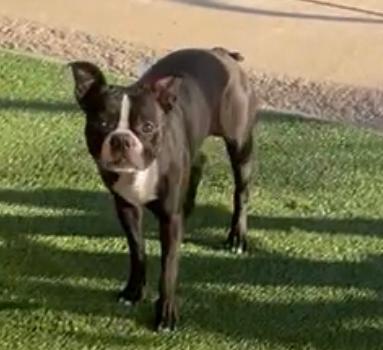
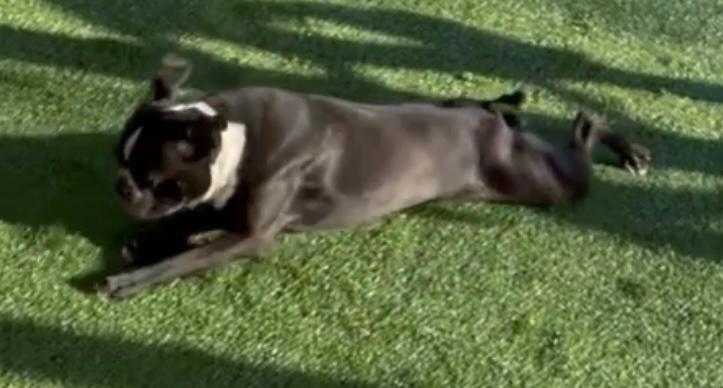
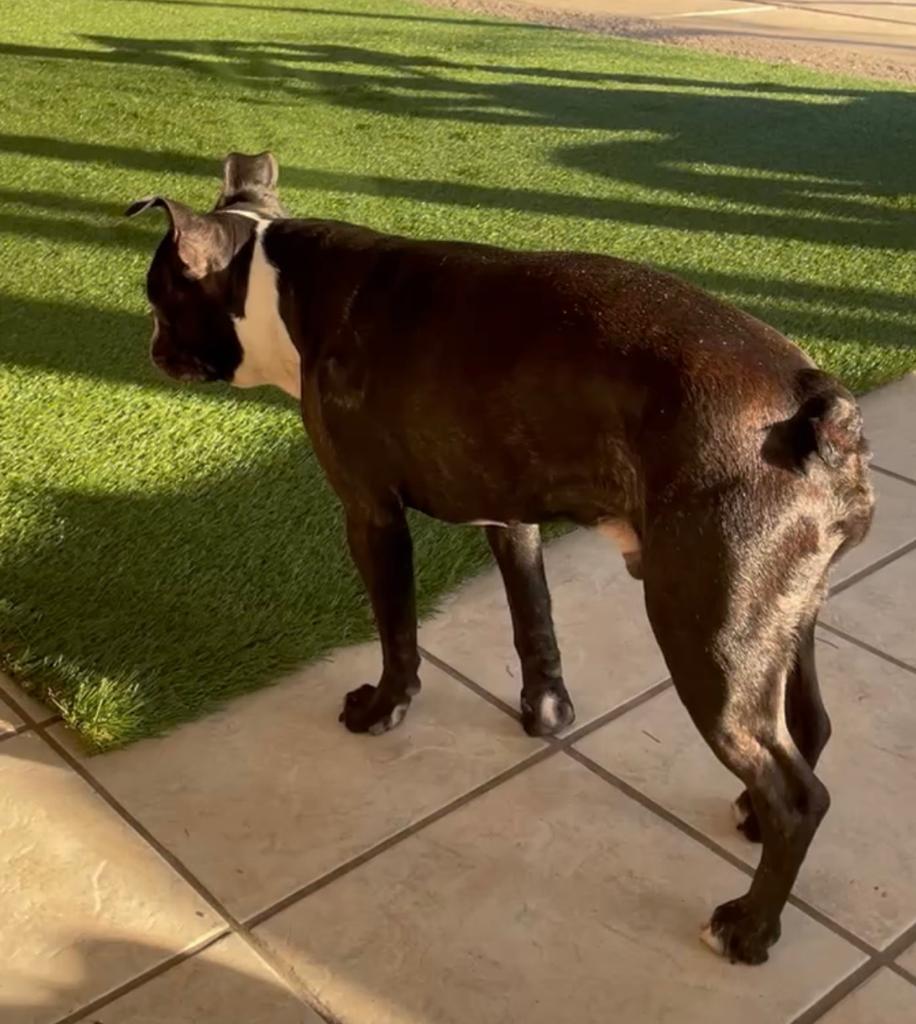
What else can you do?
Supervise: Keep an eye on your Boston Terrier while they engage in grass-sliding to ensure they don’t overdo it and risk causing abrasions or discomfort.
Grass Quality: Choose areas with softer and well-maintained grass to minimize the risk of skin irritation. Avoid places with sharp debris or potential allergens.
Regular Checks: After your dog’s grass-sliding adventures, examine their belly and skin for any signs of redness, irritation, scratches, or bumps.
Bathing: If your dog does engage in a lot of grass-sliding, consider giving them a gentle bath afterward to rinse off any potential allergens or irritants.
Consult a Vet: If you notice any signs of skin irritation, allergies, or persistent discomfort, consult your veterinarian for proper assessment and advice.
What if your Boston’s skin is irritated
If your Boston Terrier’s skin is red and irritated due to grass-sliding or any other cause, there are several steps you can take to provide relief and promote healing. First, temporarily discourage the behavior to prevent further aggravation. Gently clean the irritated area using a mild, pet-friendly cleanser, avoiding harsh soaps. Apply a cool, damp cloth or a cold pack wrapped in a cloth to soothe inflammation and reduce redness. Keep the affected area dry and well-ventilated, and discourage scratching or licking. Consult your veterinarian before applying any topical ointments or creams. If the irritation persists or worsens, or if you’re uncertain about the cause, seek professional advice.
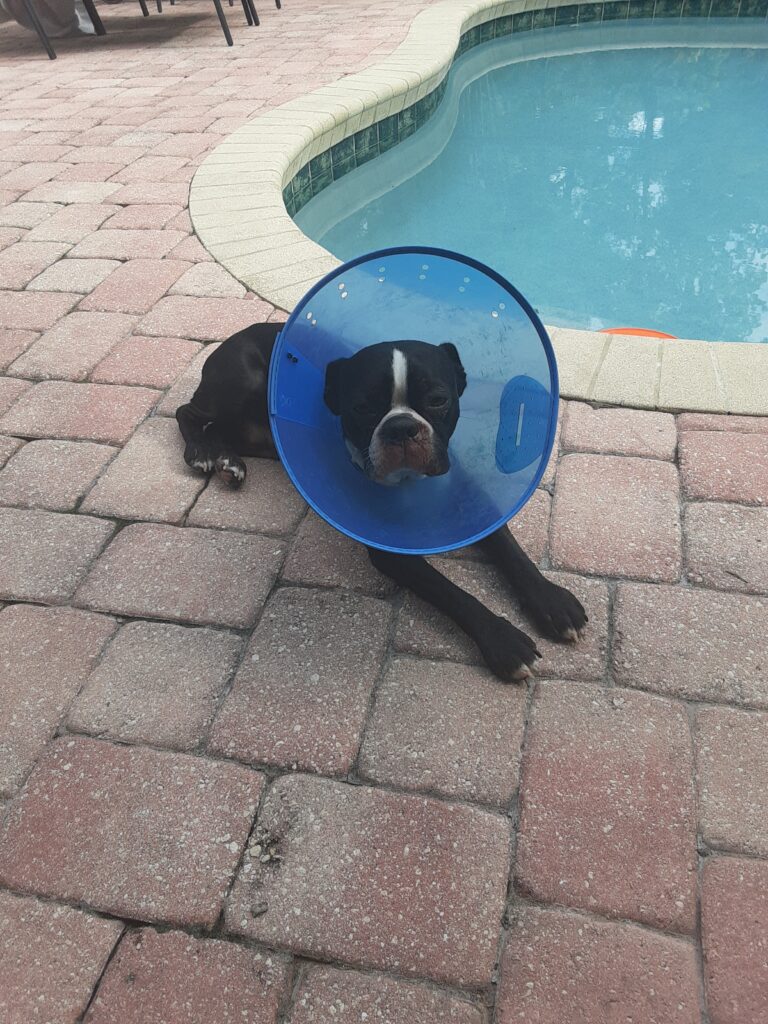
Consider using a cone collar to prevent further irritation from scratching or licking. Identify potential allergens if allergies are suspected. Ensure your dog remains hydrated and well-nourished, following your veterinarian’s guidance. Avoid over-bathing, as excessive bathing can strip the skin of natural oils. Your veterinarian can recommend specific treatments, medications, or diagnostic tests based on the severity of the irritation, ensuring your Boston Terrier’s well-being is prioritized.

